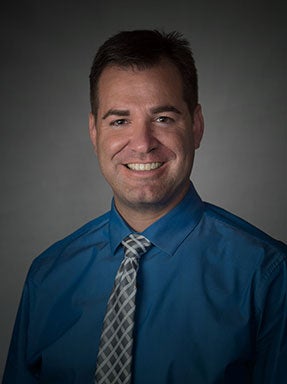Innovative Approach to Studying Traumatic Brain Injuries
New collaboration is studying how age can impact recovery time from a brain injury
“Falls are a huge public health crisis and one of the leading causes of injuries among aging adults,” says Kim Gorgens, a clinical associate professor in the Graduate School of Professional Psychologyat the University of Denver. “The more we can do about brain injury and reduce the severity, the greater improvement we can provide in terms of quality of life.”
Thanks to a pilot grant from DU’s Knoebel Institute for Healthy Aging, Gorgens has partnered with Dan Linseman, an associate professor in the Department of Biological Sciences, to study the impact of traumatic brain injuries (TBI) on aging adults. Together, they hope to uncover the reasons older adults take longer to recover from concussions — and why they suffer more severe consequences than younger people.
“Our theory is that some of this difference in age-dependent recovery is actually due to oxidative stress as you age and the depletion of a critical antioxidant in the brain called glutathione,” Linseman says. “We are testing a nutritional supplement in mice that will boost levels of glutathione. We want to see if we can make them recover more like a younger mouse.”
If the pre-clinical trials prove successful, they will open the door to the next phase of the project. “This could lay the groundwork to move forward with a clinical trial to see if we can boost glutathione levels in older human patients that have TBI and see if we can enhance their recovery,” Linseman says.
That’s where Gorgens comes in. She will be running data analysis and performing clinical testing on patients. “The ultimate aim is that we make this research more translational. That means we take things out of the lab and apply them in real life for real gains for human beings,” Gorgens says.
For this phase of the research, Gorgens and Linseman have partnered with Craig Hospital, one of the best hospitals in the country for the rehabilitation of patients with spinal cord and brain injuries. “The best part of the Knoebel Institute is the opportunity for interdisciplinary collaboration,” Gorgens says. “It brings all of these researchers from totally divergent areas together on the same project in ways that are revolutionary, innovative and completely translational.”
The Knoebel Institute, which opened this fall, focuses on finding ways to increase the healthy years of life through interdisciplinary coursework and research at DU, and by collaborating with community partners. It’s this kind of collaboration that researchers at DU hope will make a difference for aging adults.
“If we are able to generate proof that levels of this particular antioxidant are different depending on age and severity of injury, then we can press forward for larger funding,” Gorgens says. “The hope is we can design interventional studies, perhaps a nutritional supplement, that people could take to reduce the severity of a brain injury.”









